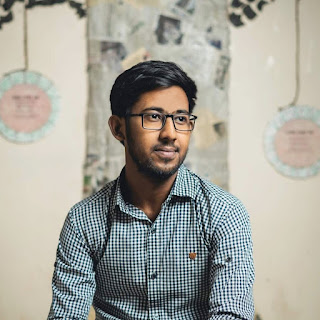Letter from Nabil from Bangladesh to Rehaan in UK
Sender: Nabil Hasan
Senders Location: Rajshahi, Bangladesh
Receiver: Rehaan Syed
Receiver Location: Glasgow, UK
Translation:
Dear Friend,
I am Nabil Hasan, living in Rajshahi. Rajshahi is a district in the Northern part of the country. It's a very neat and clean city. It is quite cold in the winter, and some serious heatwaves can be felt in the Summer. Even though I was excited about writing this letter for the past few days, I couldn't do it as my final examinations are going on. So, here I am writing the letter as I found a break in the exams.
Though I am a student of Civil Engineering, I find comfort in working with different types of people. And that feeling has led me to join the “OSCH'' project. A tempting promise of knowing and understanding historical architectural establishments, figuring out how we got to today’s world through change, development, and refinement, and how our culture got to today’s position were the other reasons. I am thinking of telling a story about an ongoing project today.
Perhaps you have heard from here and there that the history of our independent country began with the fight for our language. But languages of many ethnic communities of this country are getting lost forever. This worry led a member of OSCH to propose that we can conserve documents, books, songs, poems, and novels published in those languages attempting to save them. We acted immediately. We researched and found 12 different ethnic communities that have their own language and culture on the verge of disappearing. We were divided into two teams with six members each and decided to visit them to discuss what could be done to preserve their language.
A few words before starting the story may give some insight into why the task was so difficult. Firstly, most of these languages do not have any alphabet or written forms. So, the only source we had was their oral language. Secondly, they have faced various discriminations due to geopolitical reasons. As a result, they are instinctively hesitant to open up to us. Poverty and various superstitions act as a cherry on top of that.
So, the story is of 21 January 2023. We had been planning for a few days about visiting the Godagari area and talking to these marginal communities. The distance between Rajshahi and Godagari is only 30 kilometers. You will soon understand why I used the word marginal. As usual, I woke up at 6.40 in the morning and was making preparations. Our target was to reach Godagari by catching the bus at 8 AM, but bad news struck as soon as I woke up. Suddenly we were informed that two board members would be joining us due to unavoidable reasons. One of them was our videographer, and the other was supposed to be our guide. So we thought that we might have to cancel our trip, but somehow managed to set out for it anyway. The bump was somewhat softened when another board member joined us. We had our breakfast on the bus. By the way, all the drawbacks made us late by an hour. We reached around 10 AM. Once we got there, we were at a loss for how we would find the people we were looking for, or with whom to communicate as we lost our guide. We were not sure if anyone would help or not. However, we started for our first destination, "Rai Para" after confirming the intel with several shopkeepers, drivers, and local dwellers.
(P.S. By the way, I am sending you a pic of me with my team on a Van. I am sure you are curious about this vehicle called a van. That's why some pics of these vans are also attached.)
Anyway, it felt like we came to a different world once we reached Rai Para. All the people there live hand to mouth. They surrounded as we got there. We chatted a lot. From the community's prayer rituals to their folk tales, we recorded everything. We took some chocolates with us for the children. You cannot imagine how delighted those kids were after getting chocolates. It felt like we were becoming one with them. After talking to them, we went to the Bot-Tola Adibasi School area, to talk to the Munda community. Though the Rai did not have any alphabet, the Munda people had their own alphabet and grammar system. I cannot express how much they loved us.
An old woman named Anjali sang us a song in their own tongue. However, since we did not know their tongue, we could not understand the meaning of the song. But you know what they say, songs do not have any language. We didn’t even notice when she finished singing. No one was saying anything as everyone was listening to the song spellbound. After a few moments, we realized that we all were lost in a trance listening to the touching music of that song composed in an unknown language. It felt like we were there to find exactly that, to have that. We would have the song if the language was lost. Surprised by our silence, Ms. Anjalai asked, “Do I have to sing more?” Her question brought us back to this world and we expressed our fascination. She felt very shy and veiled her face. Even this simplicity of hers held some charm.
Pages after page will be finished but the story will not if I continue. That’s why I am ending this story with a description of a small incident. When we were returning that day, hungry and exhausted, I felt an odd sense of contentment at seeing a Marigold plant in a gutter. Normally the flowering plant grows in gardens and not in gutters. But the surrounding environment of the flower had not reduced its beauty but rather increased it. Just like that, the little peaceful memories of that tour surpassed our tiredness and made the day significant.
I am waiting to hear from you, where you live and what you do. Sadia Apu told us that you guys have asked if Bangladesh has a lot of mosquitos. Ha Ha Ha. I am really interested in getting to know you guys. I want to know how much you know about our country. I want you guys to learn more about Bangladesh through our friendship.
Yours,
Nabil Hasan.












.jpg)
Comments
Post a Comment